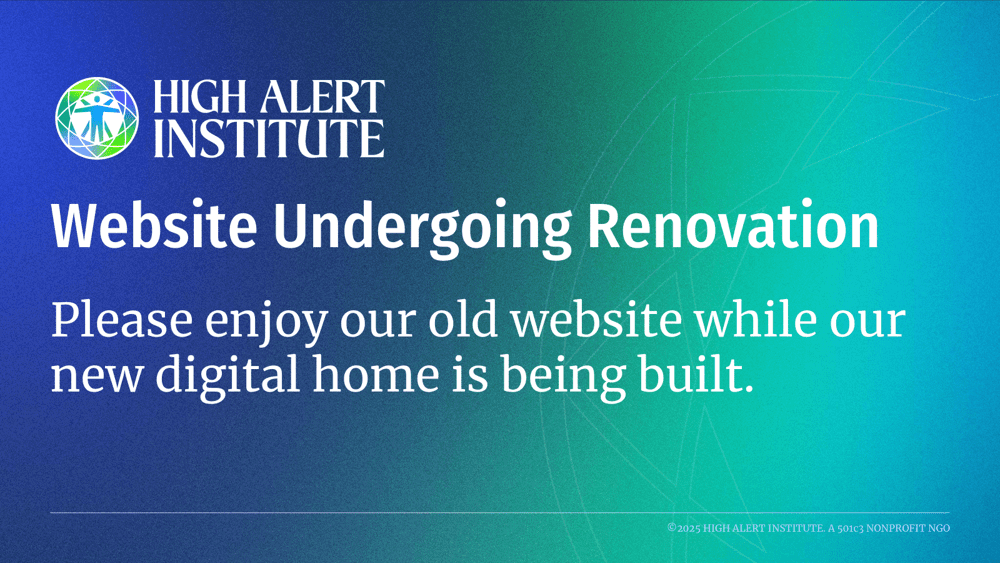High Alert Institute
Another Anniversary of 9/11
As we approach this 5th anniversary of 9/11 many are asking:
“Are we any safer now than we were then?”
As one who runs towards the disaster, it is with a heavy heart that I answer,
“No.”
The National Academies of Science recently concluded that hospitals fail to plan, fail to train and fail to integrate themselves into the community response plan. Terrorism can be mitigated, sometimes; but what happens when there is an unstoppable disaster? What happens when Mother Nature is the cause? We cannot yet mitigate an earthquake or a hurricane, a tornado or a volcano. We cannot immunize our planet against the next great pandemic or the next plague. When these disasters cause our needs to exceed our resources, the only chance to avoid absolute catastrophe is to plan and practice.
I am among that group of disaster response experts who lost colleagues and family when the towers fell. It is infuriating to argue with corporations or healthcare institutions before they will consider training to take responsibility for their part in our nation’s safety, security, and preparedness. Those who teach these most critical skills remind students that the goal is not to pass a test or gain career advancement. The goal is to go home alive at the end of the day.
On those occasions when hospitals and healthcare institutions do train, when they realize they do not have the necessary skills and bring in “the experts,” it is discouraging to see the room more than half empty. In an industry that prides itself on patient safety and customer care, to see so few people interested in preserving the most necessary of community resources, healthcare, is demoralizing beyond words.
Equally disturbing is the recent trend towards territorialism among medical specialties. Since 9/11, every specialty has sought to proclaim itself the “Masters of Disaster”. They fail to realize that most of the healthcare delivered after a disaster is simply the daily practice of medicine in more austere of conditions. They also fail to understand that the majority of disaster medicine is practiced before disaster ever strikes. Disaster Medicine specialists are essential to the integration of healthcare into the community disaster response, and the elimination of profession-specific silos of authority and knowledge. What these other specialties fail to see is that in the planning, preparation, response and recovery from disaster, the healthcare community must be a seamless team, not a collection of egocentric individuals. Rather than embracing the concept of board certification in the new specialty of Disaster Medicine, these territorial and fractious groups seek to stake their claim in this most critical part of our brave new world. In short, they have learned nothing over the last five years.
There is encouraging news. Disaster Life support (DLS) has become the de facto national standard for disaster preparedness of individuals, families, businesses and healthcare professionals and Healthcare First Responder training (HFR) has become the ruler by which hospitals and other healthcare institutions are measured. It is immensely rewarding when participants “catch the bug” and understand how important it is to be prepared to protect themselves, their families, their communities, and their patients. Much like the early days of CPR, it will take time for the nation to understand the importance of every man, woman and child knowing what to do when the wind blows, the buildings falls or the whole planet sneezes at once. Until then, those who teach these most precious skills will continue to strive to ensure that everyone goes home at the end of the day.
High Alert Institute
4800 Ben Hill Trail
Lake Wales, FL 33898
Office: 863.696.8090
FAX: 407.434.0804
EIN: 27-5078437
Info@HighAlertInstitute.org
Privacy Policy
Cookie Policy
Terms of Use
Disclaimers
Get Your Data
Shipping Policy
Message Us
Transparency
Registrations
Do Not Sell Info
Return Policy
A COPY OF THE OFFICIAL REGISTRATION AND FINANCIAL INFORMATION MAY BE OBTAINED FROM THE DIVISION OF CONSUMER SERVICES BY CALLING TOLL-FREE, WITHIN THE STATE, 1-800-435-7352 (800-HELP-FLA), OR VISITING www.FloridaConsumerHelp.com. REGISTRATION DOES NOT IMPLY ENDORSEMENT, APPROVAL, OR RECOMMENDATION BY THE STATE. Florida Registration #CH68959
REGISTRATION WITH A STATE AGENCY DOES NOT CONSTITUTE OR IMPLY ENDORSEMENT, APPROVAL OR RECOMMENDATION BY THAT STATE.










